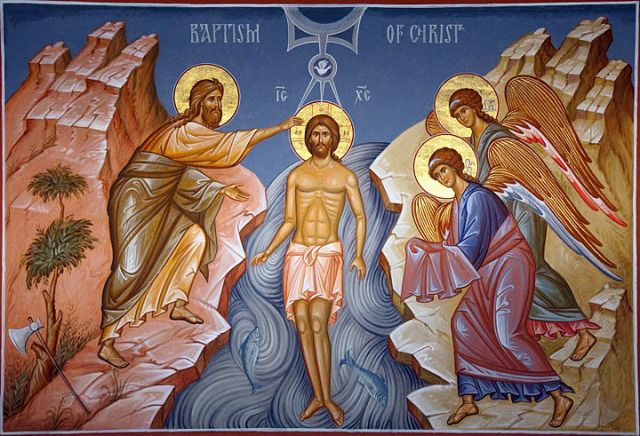Baptism of Our Lord, Gospel Year C
God’s Beloved
Luke 3:15-17, 21-22
Baptism of Our Lord
Analysis by Brad Haugen
15As the people were filled with expectation, and all were questioning in their hearts concerning John, whether he might be the Messiah, 16John answered all of them by saying, “I baptize you with water; but one who is more powerful than I is coming; I am not worthy to untie the thong of his sandals. He will baptize you with the Holy Spirit and fire. 17His winnowing fork is in his hand, to clear his threshing floor and to gather the wheat into his granary; but the chaff he will burn with unquenchable fire.”
21Now when all the people were baptized, and when Jesus also had been baptized and was praying, the heaven was opened, 22and the Holy Spirit descended upon him in bodily form like a dove. And a voice came from heaven, “You are my Son, the Beloved; with you I am well pleased.”
 God’s own forgiveness is imparted to unworthy people who are themselves unable to dispel their own doubts or escape death’s shadow. … Jesus gathers us to himself and to his Father as we hear our own baptismal promise: “You are my […] Beloved; with you I am well pleased” (Luke 3:22).
God’s own forgiveness is imparted to unworthy people who are themselves unable to dispel their own doubts or escape death’s shadow. … Jesus gathers us to himself and to his Father as we hear our own baptismal promise: “You are my […] Beloved; with you I am well pleased” (Luke 3:22).
DIAGNOSIS: Unworthy and Faithless
Step 1: Initial Diagnosis (External Problem): Unfulfilled Expectations
“Black and white” thinking and a “good vs. evil” worldview seem to prevail in our world today. The news and social media do much to reinforce that kind of thinking and worldview. Which side am I on? Which side are you on? We are filled with the expectation that we are on God’s side while those who disagree with us are not. But we are not so sure when the opposition claims to be on God’s side too; their attacks fill us with anxiety and defensive, after all. Surely, we both can’t be right. We welcome John the baptizer’s message when we are filled with the expectation that when the Messiah does his sorting – wheat from chaff – he will be on our side, “the right side of history,” as we expect to be. However, our expectations remain fleeting as another social media firestorm, in which we once again feel attacked, forces us, once again, to be anxious, angry, and defensive.
Step 2: Advanced Diagnosis (Internal Problem): Chaff
John the baptizer’s proclamation of the Messiah places all our expectations in the category of chaff. We will not sort the good from the bad people as we had expected. The Messiah will do the sorting; the Messiah who John claims is more powerful than he is. Sorting the good from the bad, what is to be gathered from what is to be permanently canceled, is out of our hands. Not even Twitter gets to decide. The self-described good people, including us, may be chaff ourselves if what John says about the Messiah is true.
Step 3: Final Diagnosis (Eternal Problem): Unworthy
John the baptizer himself claims to be unworthy of the Messiah. “I am not worthy to untie the thong of his sandals” (Luke 3:16), he says. John’s unworthiness is a posture of deep respect, even reverence, toward the Messiah. But John’s unworthiness and our own unworthiness go much deeper than that. After baptizing Jesus, John was imprisoned and later beheaded by Herod Antipas. While he was in prison, however, John sent word to Jesus: “Are you the one who is to come, or are we to wait for another?” (Luke 7:19). When faced with his own imprisonment and death, John could no longer believe without a doubt that Jesus was the Messiah. John had, after all, asked Jesus: “Are you the one who is to come, or are we to wait for another?” (Luke 7:19). The reality of doubt in our own hearts, as well the inescapable shadow that death casts over each of us, render us unworthy of Jesus, the Messiah. Our own faith and proclamation fail because we don’t believe in anyone claiming to be the Messiah who ends up on a cross.
PROGNOSIS: Gathered, Loved, and Sent
Step 4: Initial Prognosis (Eternal Solution): Gathered
God the Father nevertheless calls Jesus, the crucified Messiah, God’s Beloved. The promise that God declared at Jesus’ baptism, “You are my Son, the Beloved; with you I am well pleased” (Luke 3:22) is fulfilled in Jesus’ death and resurrection. The mission of the Beloved Son is complete when Jesus utters from the cross: “Father, forgive them; for they do not know what they are doing” (Luke 23:34). God’s own forgiveness is imparted to unworthy people who are themselves unable to dispel their own doubts or escape death’s shadow. We who once were the throwaway chaff are instead gathered like choice wheat. Jesus, the Messiah, gathers us to himself and to his Father as we receive the promise of forgiveness. Jesus gathers us to himself and to his Father as we hear our own baptismal promise: “You are my […] Beloved; with you I am well pleased” (Luke 3:22).
Step 5: Advanced Prognosis (Internal Solution): Beloved
Whether God loves us doesn’t depend on us meeting our expectations of ourselves, or on us fulfilling others’ expectations of us. We haven’t even met God’s expectations. And yet, God calls us beloved along with God’s own Son. We no longer desire to enlist God on our side, against the people with whom we disagree. Thanks to John the baptizer, God’s judgment has already revealed our expectations for what they often are: self-serving, vengeful, and power-seeking – over against God and other people. Rather than meet our expectations, God has set us free from those expectations through the forgiveness of God’s Beloved Son. We trust in this divine love as we too are called beloved. Our fears and doubts lose their power, as does death’s shadow; we rejoice and are relieved to join the community of the Beloved Son.
Step 6: Final Prognosis (External Solution): Sent
The Holy Spirit accompanies us within the community of the Beloved Son, just as the Spirit accompanied Jesus at his baptism. Within the community of God’s Beloved, we are no longer driven by our own expectations, “black and white” thinking, or “good vs. evil” worldview. We no longer need to anxiously sort the wheat from the chaff. Nor do we need to despair that God is more powerful than we are. Rather, we are sent forth by the Spirit to declare more and more people “beloved.” Through the baptism of God’s own Son, as well as our own baptism, God has entrusted us to share the promise that God intends for all people: “You are my […] Beloved; with you I am well pleased” (Luke 3:22). This promise exceeds any of our expectations. The Spirit mysteriously uses our faltering faith – our imperfect speech and actions – to gather more unworthy people like us into the community of the Beloved Son.
